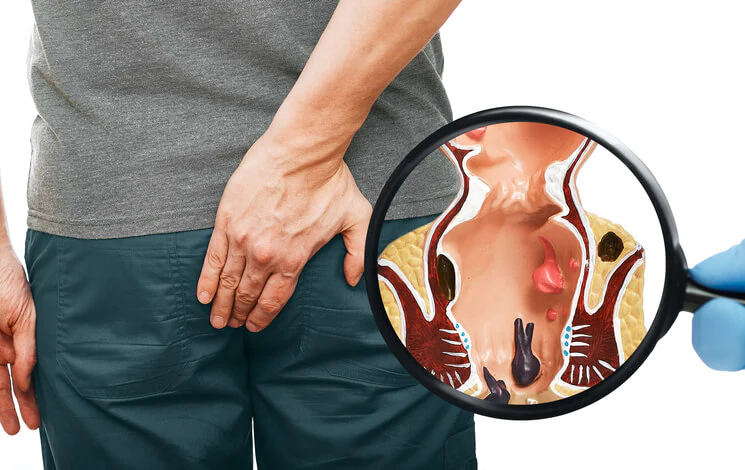03 Feb 2026
Rhinoplasty Revision Surgery in Mohali: Cost When Your First Nose Job Fails


Dr. Srinath Shankar Rathod
14 Aug 2025
Call +91 80788 80788 to request an appointment.
Piles, also known as hemorrhoids, are a common condition affecting millions of people globally. They occur when the blood vessels in the rectal or anal area become swollen and inflamed, leading to discomfort and pain. It’s important to recognize that while piles can be a sensitive topic, they are treatable and manageable with various options available. At Livasa Hospital, we specialize in providing comprehensive care for patients with piles in Mohali and the surrounding regions.
Piles are categorized into two main types, each with distinct characteristics and symptoms. Understanding the different types is essential for effective treatment.
Understanding whether you are suffering from internal or external piles is crucial for your treatment plan. At Livasa Hospital, our expert team conducts comprehensive examinations to determine the type of piles you have and recommend the best course of action.
Recognizing the symptoms of piles can help you seek timely treatment. Common symptoms include:
Symptoms can vary from person to person, and while they may be mild in some cases, it's paramount to consult a health professional. At Livasa Hospital in Mohali, we encourage patients to schedule an appointment if they experience these symptoms to prevent complications.
The underlying causes of piles can often be linked to various lifestyle and genetic factors. Some of the notable causes include:
By understanding these causes, individuals can take proactive measures towards prevention. At Livasa Hospital, we offer guidance on lifestyle changes that can help reduce the risk of piles.
Diagnosing piles typically requires a thorough evaluation from a healthcare provider. During your visit to Livasa Hospital, our skilled general surgeons will perform an assessment that may involve:
Prompt diagnosis is essential for implementing the right treatment plan and avoiding complications. Our team is dedicated to ensuring a comfortable and private environment, discussing all findings transparently with you.
There are numerous treatment options available for piles, varying from non-invasive methods to surgical interventions. The selected approach often depends on the severity of the condition and individual patient health. Below are some widely recognized options:
| Treatment Type | Description | Suitability |
|---|---|---|
| Conservative Management | Includes dietary changes, increased fiber intake, and over-the-counter medications. | Best for mild symptoms and prevention. |
| Non-Surgical Procedures | Techniques like rubber band ligation, sclerotherapy, and infrared coagulation. | Suitable for various severity levels when surgery isn't preferred. |
| Surgical Treatment | Piles surgery may be recommended for severe cases or persistent symptoms. | Considered for significant discomfort or recurring issues. |
At Livasa Hospital, we work closely with patients to evaluate their options and recommend the most suitable treatment pathways. This personalized approach allows us to cater to your individual needs while maintaining the highest standards of care.
In cases where non-surgical methods aren't effective, piles surgery can provide definitive relief. Surgical options may include:
The surgical procedure is usually performed under general anesthesia, and patients can expect to spend some time in recovery afterward. Here at Livasa Hospital, our dedicated team ensures a comprehensive pre-operative assessment to prepare you adequately and support your recovery journey.
Recovery after piles surgery varies from individual to individual, but there are essential tips to ensure a smooth healing process:
We encourage patients at Livasa Hospital to stay connected with our care team for any concerns during the recovery process, ensuring concerns are addressed promptly.
At Livasa Hospital, we pride ourselves on being one of the best piles treatment facilities in Amritsar and Mohali, providing dedicated service to our patients. Our general surgery experts are trained in the latest techniques to ensure the best outcomes in piles treatment.
Additionally, we offer:
Should you require help or have additional questions, feel free to reach out to Livasa Hospital. We are here to support you through every stage of your health journey, offering compassion and expertise.
Reach out today for an appointment at Livasa Hospital, located in Mohali. Your path towards relief from piles begins here.
This article was written by a qualified medical professional at Livasa Hospital, sharing insights based on professional experience in the field.
Rhinoplasty Revision Surgery in Mohali: Cost When Your First Nose Job Fails
Plastic Surgery After Massive Weight Loss: Body Contouring Packages in Mohali
ENT + Cosmetic in Mohali: Septoplasty for Breathing with Cosmetic Rhinoplasty Offers
Livasa Healthcare Group Corporate Office,Phase-8, Industrial Area, Sector 73, Sahibzada Ajit Singh Nagar, Punjab 160071
| Mohali | +91-99888 23456 |
| Amritsar | +91-99887 49494 |
| Hoshiarpur | +91-99883 35353 |
| Nawanshahr | +91-75081 82337 |
| Khanna | +91-98888 05394 |